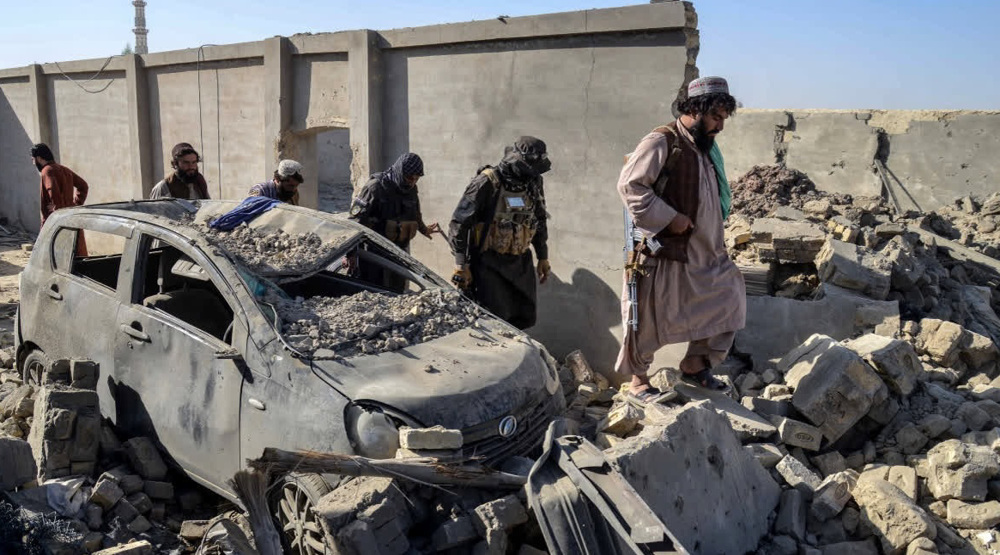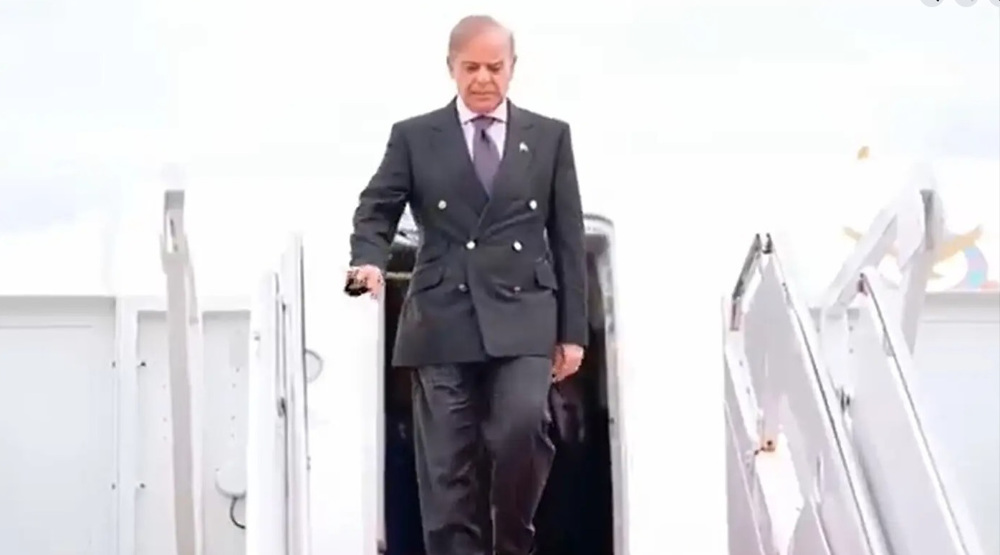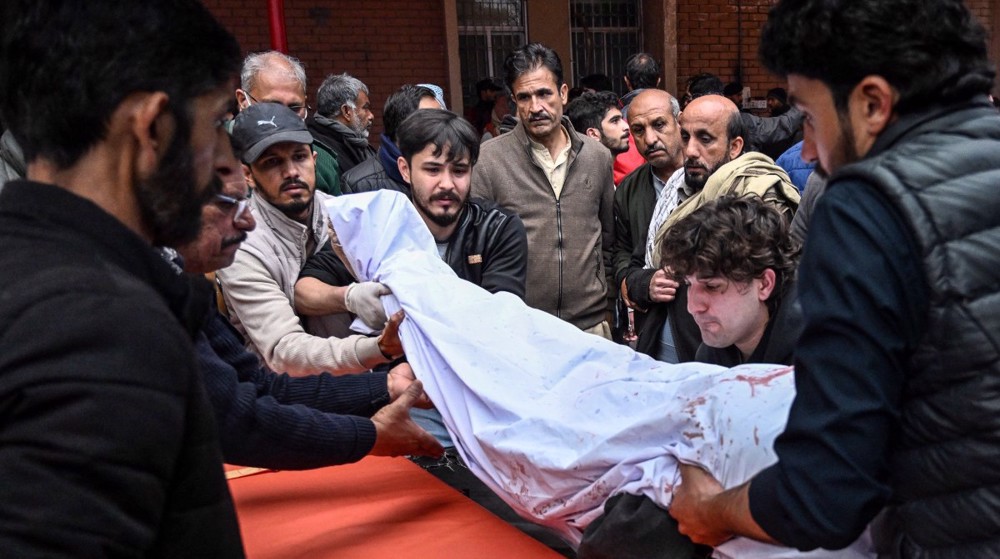Pakistan downgrades India ties as China slams New Delhi over Kashmir
Pakistan has announced that it will expel the Indian envoy and suspend trade in a deepening row over New Delhi's move to tighten its grip on disputed Himalayan region of Kashmir.
"We will call back our ambassador from Delhi and send back their" envoy, Pakistan's Foreign Minister Shah Mehmood Qureshi announced in televised comments Wednesday.
The Pakistani government earlier released a statement declaring that Islamabad would suspend trade with India and review its bilateral ties with Delhi.
"Prime Minister Imran Khan today chaired meeting of the National Security Committee" to discuss the "unilateral and illegal actions by the Indian government" in Kashmir, the statement said.
Khan "directed that all diplomatic channels be activated to expose brutal Indian racist regime, design and human rights violations," the statement added.
The Pakistani premier also called on the military to continue its "vigilance."
Khan said in an address to the Pakistani parliament on Tuesday that he was weighing taking the matter to the United Nations Security Council.
“We will fight it at every forum. We’re thinking how we can take it to International Court (of Justice) ... to the United Nations Security Council,” Prime Minister Imran Khan told Pakistan’s parliament.
And the Pakistani army chief has said the military would “go to any extent” to support people in in the disputed Himalayan region.
Chief of Army Staff General Qamar Javed Bajwa expressed support for the people of Kashmir after a meeting with top commanders in the garrison city of Rawalpindi on Tuesday.
“Pakistan Army firmly stands by the Kashmiris in their just struggle to the very end,” Bajwa said. “We are prepared and shall go to any extent to fulfill our obligations in this regard.”
China slams India's move to change Kashmir's special status
Indian plan to change the status of the disputed Himalayan region of Kashmir has also faced fierce opposition from China.
Foreign Ministry spokeswoman Hua Chunying in a recent statement said it opposed India’s decision to revoke Kashmir’s special status and that New Delhi needed to be cautious on border issues.
“India’s action is unacceptable and would not have any legal effect,” she said
China urged India to strictly abide by the agreements reached by both countries in order to avoid any actions that would further complicate boundary issues, Hua noted.
She reiterated that India’s claim over Ladakh, as part of Kashmir, involved Chinese land.
The Himalayan region is divided between India, which rules the populous Kashmir Valley and the Hindu-dominated region around Jammu city, Pakistan, which controls a wedge of territory in the west, and China, which holds a thinly populated high-altitude area in the north.
China earlier this year also condemned a visit by Indian Prime Minister Narendra Modi to a disputed border region which triggered a war between the nuclear-armed neighbors in 1962.
The latest statement by China drew an immediate rebuke from Delhi.
Indian foreign ministry spokesman Raveesh Kumar said splitting Jammu and Kashmir into federal territories was a domestic issue.
“India does not comment on the internal affairs of other countries and similarly expects other countries to do likewise,” Kumar stressed.
The developments come after government of Premier Modi revoked the special status of Indian-administered Kashmir on Monday, a move described by Pakistan as “illegal.”
The Indian Ministry of Home Affairs announced that Indian President Ram Nath Kovind had signed a decree abolishing Article 370 of the constitution, which grants a measure of autonomy to Jammu and Kashmir, including the right to draft its own laws.
The president also moved a bill proposing that the Indian-controlled part of Kashmir be divided into two regions directly ruled by New Delhi.
The government in New Delhi also lifted a ban on property purchases by people from outside Jammu and Kashmir, opening the way for Indians to invest and settle in the disputed region like any other part of India.
Modi had earlier pushed for radical political changes in Jammu and Kashmir even before he won a re-election in May. Modi said the old laws had hindered Kashmir’s integration with the rest of India.
Moreover, prominent political leaders in the Indian-controlled region of Kashmir were placed under house arrest and the Indian paramilitary forces deployed thousands of extra troops across the region, raising fears of a crackdown.
Srinagar a ghost town
Armed soldiers on Wednesday stood in front of coils of barbed wire in Indian Kashmir's summer capital of Srinagar as a massive security lockdown imposed on the restive region by New Delhi government took hold.
Armed soldiers on street corners and in front of barbed-wire barricades were among the few people to be seen.
Locals and even security personnel fear that once the curfew lifts, unrest will break out as protesters vent their anger at the national government's action.
"You can't hold a state under curfew forever," Iltija Javed, daughter of detained former chief minister Mehbooba Mufti, told AFP from Srinagar.
"I'm sure people in the valley are not going to take this lying down."
Photos and video images circulating on social media also showed deserted streets in Srinagar, which has been at the heart of a nearly 30-year armed revolt against Indian rule.
Some shopkeepers said stocks were running out after days of panic-buying.
“No provisions are left in my shop, and no fresh supplies are coming,” media outlets quoted grocery store owner Jehangir Ahmad as saying
At a Srinagar hospital hit by the crackdown on telephone and internet communications, staff were working overtime, with ambulances sent to bring in doctors and nurses.
“We are managing for now,” said a senior official at the 500-bed Lal Ded hospital.
India’s move sparks fresh protest in Pakistan-administered Kashmir
In Muzaffarabad, the capital of Pakistan-administered Kashmir about 45 kilometers from the neighbors’ disputed border, protests entered a second day, with hundreds of people, including children, shouting anti-India slogans.
Many Kashmiris have relatives on both sides of the border, but those on the Pakistani side say they have been unable to reach people in India for days.
Tanveer-ul-Islam, who migrated to Muzaffarabad in 1990, said he had lost touch with his mother in Indian-controlled Kashmir since Sunday.
“You can’t even imagine my pain,” he added. “We do not know about the well-being of anyone across the divide.”

Kashmir has been split between India and Pakistan since partition in 1947. Both countries claim all of Kashmir and have fought three wars over the territory.
India regularly accuses Pakistan of arming and training militants and allowing them across the frontier. Pakistan strongly rejects the accusation.
Indo-Pakistani relations nosedived in February when over 40 Indian paramilitaries were killed in a bomb attack in Kashmir. New Delhi blamed Pakistan-based militants. Islamabad denied any involvement.
Iran, US move ‘closer to agreement’ after ‘serious, longest’ round of talks: FM
Israeli army chief privately warns of cost of new war with Iran: Report
IRGC official: US buildup, psychological tactics aim to 'swallow Iran again'
Iran’s three-man team captures triple gold at UWW ranking series in Tirana
Iranian academic sentenced to 4 years in prison in France for supporting Palestine
VIDEO | Press TV's news headlines
Russia: West seeks to repeat past ‘plunder’ of Iran’s oil
Herzog visits Ethiopia to expand Israeli footprint in Africa
















 This makes it easy to access the Press TV website
This makes it easy to access the Press TV website